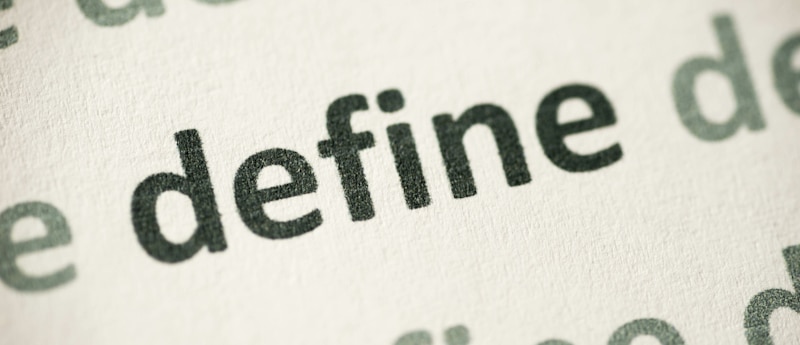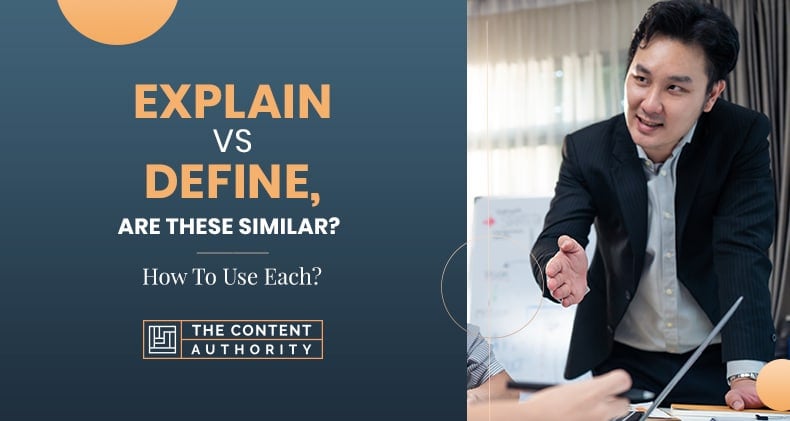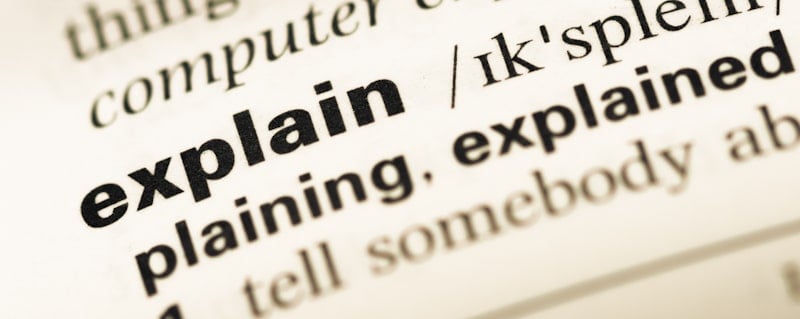Language is full of terms and words that seem to be related to one another. For example, you probably heard the terms “explain” and “define” before but don’t know exactly the difference between them.
These words are similar and sometimes confusing. You will use “explain” when someone puts into words their understanding of something. You can use “Define” to talk about the exact meaning of a word.
We will help you expand your vocabulary and give you more details to help you understand how other cases you can use each word.
Understanding The Terms “Explain” And “Define”
These concepts might be complicated for some people. However, understanding their meaning is crucial for those undergoing exams such as GCSE, A level, IETLS, TOEFL, and so on.
Etymology
“Explain” comes from the Latin word “explanare,” which means “to make flat” or “to extend something.”
The term “define” comes from the Latin word “definire,” which means “to assign” or “to limit.”
Meaning Of “Explain” And “Define”
Both words have several meanings depending on the context you are using them.
Explain: As A Verb
- To help someone understand a concept by giving more information.
- To justify or give reasons why.
- To be the reason why something happens.
Define: As A Verb
- To give the meaning of a word.
- To provide the limits of something.
- To clearly show the outline of something.
How People Use Them
“Explain” and “define” are both regular verbs. To form the past tense, add -ed at the end of them.
As we mentioned earlier, you will see these words in tests. Additionally, people use them in everyday conversations. So, here we have gathered a few scenarios that can better illustrate how people use these words.
How People Use Explain
- When you talk to a possible investor to convince them, you will have to explain what you do. People tend to feel more secure about deciding once they have all the facts.
- When someone misbehaves and is caught, this person will try to explain what happened.
How People Use Define
- Once you have convinced your investor, it is time to define the margin profits he will receive. It is vital to set the expected agreement of your partnership.
- If a person committed a crime, a judge would define the sentence. If we are talking about a naughty child, their parents will determine and define the precise punishment.
How People Use Them On The Internet
- The subreddit ELI5 (explain like I’m 5) has roughly 20 million members who share their questions about complicated subjects waiting for other users to answer.
- According to the urban dictionary, an explainabrag is someone who explains something while bragging about their knowledge.
- Defined is slang for a good-looking person.
How To Pronounce Explain
The IPA suggests the pronunciation should be /ɪkˈspleɪn/. So we have a two-syllable word where the stress occurs in the second syllable.
Here the first sound would be the short “I” as in the word “bit.” Next, we will move the back of our tongue to close the airflow in our throat to make the /k/ sound and rapidly release the air to make the /s/ sound. Now we have reached the second syllable, and we will close our lips to make the /p/ sound, which is followed by the dark /l/ sound. The vowel sound here is a diphthong /eɪ/, the same sound in the word “bait.” Finally, you move your tongue to your palate while leaving your lips spread to end with the /n/ sound.
How To Pronounce Define
The IPA suggests the pronunciation should be /dɪˈfʌɪn/. “Define” is also a two-syllable word where the second syllable is the stressed one.
Here we will start with our lips spread, teeth closed, and the tip of our tongues should be touching to make the /d/ sound. Then we will open our teeth to make the /ɪ/ sound. Now, we will move to the second syllable, where the stress happens. The second syllable is pronounced the same way as the word “fine.” You start with the “f,” then move your lips to an unrounded position to make the /ʌɪ/ sound. You finish by moving your tongue to your palate while leaving your lips spread to end with the /n/ sound.
Other Similar Terms
Here we have a list of other terms you can use as synonyms for the word “explain.”
- Clarify
- Demonstrate
- Illustrate
- Justify
- Put in plain English
- Break down
- Get into details
- Reveal details
- Shed some light upon something
- Untangle
Here we have a list of other terms you can use as synonyms for the word “define.”
- Specify
- Describe
- Detail
- Distinguish
- Express
- Make something clear
- Outline
- Report
- Name
- Delimit
Related Terms
- Explain yourself: used to give out excuses to justify one’s actions.
- Explain something away: a phrasal verb used to minimize something that just happened to avoid punishment.
- Definable: an adjective that describes something that can be defined.
- Definiendum: Something that is subject to definition.
- Defining moment: a noun people use on a point in time where things start to change drastically.
- Defined-contribution: a retirement plan similar to 401(k) made by the contributions from the employee and employer.

Common Questions
When to use “explain” or “explains”?
You will use “explain” with the pronouns “I,” “you,” “we,” and “they.” The term “explains” you will use with the pronouns “he,” “she,” and “it.”
What is the difference between “explain” and “describe”?
To describe means to make a visual description of something. When you “describe,” you use a series of adjectives to make sure the other person understands what you are talking about. We could say that “describing” is a form of “explaining.”
Can we say “explain about”?
No, the correct way to use the verb is to add the object right after it. For example, “explain the address,” “explain his reasons.” It is not correct to use this preposition because you are talking about a particular item when you use this verb.
Is it correct to say “unexplainable”?
Yes, it is linguistically correct to say “unexplainable.” However, this term is not very common, and there are other alternatives you can use. For example, mysterious, enigmatic, inexplicable.
Is it correct to say “undefinable”?
Yes, it is. You can also use “indefinable” to talk about what we cannot define.
Example Sentences Using “Explain” And “Define”
Here are some sample sentences using the term “define.”
- She should define the objectives so that there are no more questions about this matter.
- Grace is a great person who doesn’t let her past define her.
- Life is a complex concept to define.
- In this part of the assignment, you had to define the problem.
- Mount Everest defines the border between China and Nepal.
Here are some sample sentences using the term “explain.”
- Lois tried to explain to her mother why she wouldn’t vote in the next elections.
- We always say using plain language is the best way to explain any concept, no matter how difficult it may be.
- It is tiring to have to explain everything individually. Isn’t there a more efficient way to do it?
- He tried to explain his reasons, but it was too late; the grand jury had already decided.
- Martha showed her how to use the phone; unfortunately, I don’t think grandma understands how to use it.
Final Thoughts About The Terms “Explain” And “Define”
Our job here is done. We have helped you to understand how to use the words “explain” and “define.” We tried to be as detailed as possible to describe these concepts to you. Now you should be able to define each one of them and explain how people use them in English.
Shawn Manaher is the founder and CEO of The Content Authority. He’s one part content manager, one part writing ninja organizer, and two parts leader of top content creators. You don’t even want to know what he calls pancakes.


